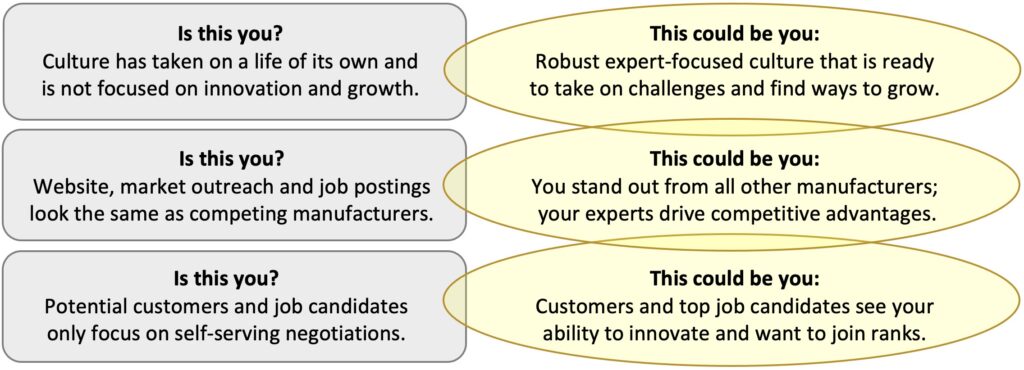Culture of Experts
You can pay a culture-based consulting firm $50k
and they’ll develop your workforce and grow your
business. Or, you can stay here and do it yourself
for free. Compare this website to theirs, and you’ll
see, our proprietary formulas are simply superior.
Human Castle LLC welcomes you to Culture of Experts, the world’s only 100% free do-it-yourself culture-based consulting platform.
The proprietary formulas within Culture of Experts were derived from thousands of hours of recruitment within manufacturing and over 2,000 hours of further development. Comparing our website to top culture-based consulting firms, you can instantly see the difference in depth. Yet, our offering is 100% free. What’s the catch? We only ask that your company’s leadership, hiring managers and Human Resources know we are contingent recruiters and your company considers using our recruitment services to hire expert-level talent when needed. After seeing our methods, you’ll probably want to use us anyway.
In addition to Culture of Experts, we also have a 100% free do-it-yourself employee development and retention program called CareerSteady. It is specifically designed for your company’s experts and aspiring experts. You can find it at CareerSteady.com.
For those who resonate with our ideas and are in need of professional services right now, our Human Castle LLC website is at humancastle.com.
Take our new video tour →
Culture of Experts
A quick introduction
Leadership steers the ship, however, their clearest vision can only reach as far as their ship can sail. To grow, leadership must have deep distance of sight. To get there, they must grow the capabilities of their crew …
Module #1
Unconventional Positions
For general industry and global perspectives, white collar and blue collar designations might make sense. At a company or worker level, they are a gross oversimplification, as they do not take into account the complexity of the work that is being performed or the work that needs to be done …
Module #2
Unconventional Expert Characteristics
In the age of the internet, information is quickly at our fingertips. Because of this, there is a new breed of experts. Where traditional institution-guided experts are deeply rooted within stationary schools of thought, this new breed of experts will thrive on real-time information, with the use of the internet as a tool. Outside of a standardized way of thinking, they will focus on the relevancy of information …
Module #3
Expert-Trek: The Journey to Mastery
The expert-trek is more than a work-process. It is an expert’s long-term commitment to achieve mastery within a chosen circumference of expertise. When traditional institution-guided experts commit to an expert-trek, their circumference of expertise is generally outlined by their well established profession or skilled trade. Mastery is expected …
Module #4
Process-Replication
In this module, we will look at where the lines are drawn between individual work-process and company-process and ask this question: If an unconventional expert has an individual work-process that leads them to achievement, can parts of this process be replicated to help other employees reach achievement? …
Module #5
Mentor-Protege Structure
In this module, we’ll look at process-replication from a different angle. We will split up an expert-level position so that some parts can be assigned to a potential Unconventional Expert, within a mentor-protege structure …
Module #6
Unconventional Projects
Previously, we looked at Unconventional Experts at play, that is, studying their characteristics as they bask in their favorite hobbies. Within hobbies, we can see the complexity of their individual work-process, even though they are not getting paid. In this module, we will look deeper into their complex work, as it pertains to work performed within company projects …
Module #7
Ideas
Ideas expand business. Ideas can make process more efficient, spark customer service, improve sales strategies and shape marketing programs. Ideas create new products and services. Even though the term intellectual property is often associated with copyrights, trademarks and patents, they are simply ideas that belong to the company that created them …
Module #8
Unconventional Training
un·con·ven·tion·al – not based on or conforming to what is generally done.
train·ing – the action of teaching a person a particular skill or type of behavior.
un·con·ven·tion·al train·ing – the action of teaching a person a particular skill or type of behavior, not based on or conforming to what is generally done …
Module #9
Behavior Within Corporate Culture
Corporate culture has an organic component, which is the group dynamics that occurs when human beings come together for a unified purpose. Group dynamics can be different from department to department, however, there is always a company-wide dynamic that might be better described as an impression …
Module #10
An Expert-Driven Organization
Module #11
Corporate Culture Assessment
Culture of Experts is a start-to-finish employee training and talent acquisition program that includes a corporate culture assessment. This assessment allows company leadership, hiring managers, HR professionals and corporate trainers to rate their own corporate culture to see if it currently reflects a Culture of Experts …
Module #12
Culture of Experts Interview Questions
Culture of Experts is a start-to-finish employee training and talent acquisition program that includes interview questions. These interview questions can help company leadership, hiring managers, HR professionals and corporate trainers hire Unconventional Experts …
Module #13
Recruiting Experts
The ability to add exceptional talent to an organization is one of the most important qualities of leadership. Another important quality of leadership is delegation. However, if leadership delegates responsibilities and tasks associated with talent acquisition, at what point are they overly removed from the process? …
Module #14
AI: What Jobs will it replace?
Artificial Intelligence (AI) will be the next world-altering technological advancement. Soon, AI software applications, AI robots and AI self-driving vehicles will be advanced enough to outperform humans with many tasks, eliminating far more jobs than they add. AI adoption will be a matter of economics and companies that chose to ignore obvious financial advantages will not be able to compete …
Module #15
Mentoring Students – The Expert Way
It is important to encouraging students to chose an educational path that can lead them to a place that is rich with opportunity. They should also understand that they have the ability, if not responsibility, to become experts at whatever it is they do …
Congratulations!
You have completed all modules
Completing all Culture of Experts modules brings one to the next step, sharing these concepts with employees. Check out CareerSteady.com; training workshops designed to develop experts and aspiring experts. Contact us today and see how you can use this training to increase employee productivity and retention.
Grow a Culture of Experts as you expand your company, use our recruiting services to fill your next open REQ. Go to ww.humancastle.com and call us at (716)222-3535.
© 2025 Human Castle LLC, unauthorized duplication is a violation of applicable laws.





















